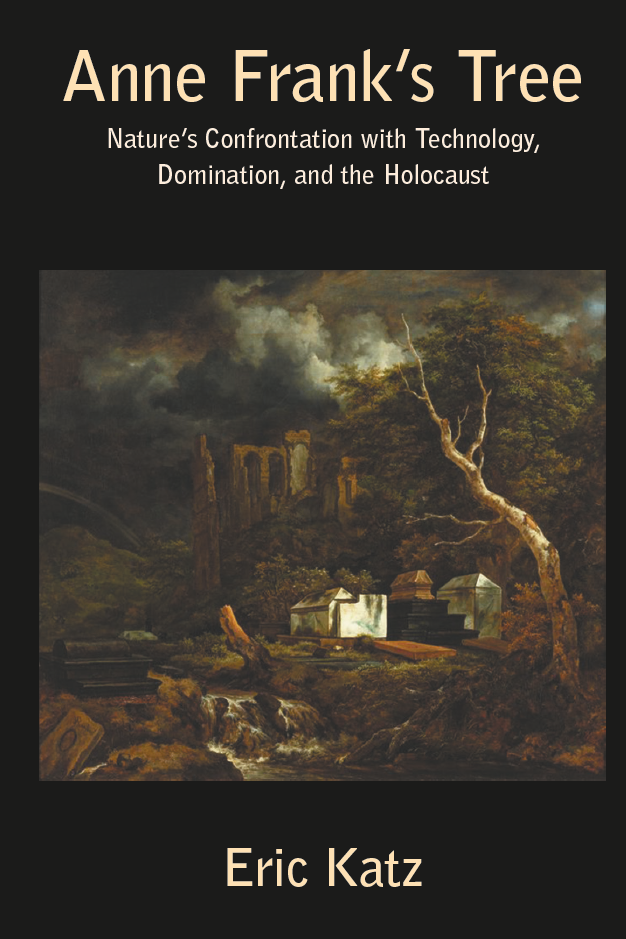Anne Frank’s Tree
Nature’s Confrontation with Technology, Domination, and the Holocaust
Eric Katz
‘This work is an impressive synthesis of environmental ethics, philosophy of technology, and Holocaust studies.’
Avner de-Shalit – Environmental Values

In this important and original interdisciplinary work, well-known environmental philosopher Eric Katz explores technology’s role in dominating both nature and humanity. He argues that technology dominates, and hence destroys, the natural world; it dominates, and hence destroys, critical aspects of human life and society. Technology causes an estrangement from nature, and thus a loss of meaning in human life. As a result, humans lose the power to make moral and social choices; they lose the power to control their lives. Katz’s argument innovatively connects two distinct areas of thought: the fundamental goal of the Holocaust, including Nazi environmental policy, to heal the degenerate elements of society; and the plan to heal degraded natural systems that informs the contemporary environmental policy of ‘ecological restoration’. In both arenas of ‘healing’, Katz argues that technological forces drive action, while domination emerges as the prevailing ideology. Katz’s work is a plea for the development of a technology that does not dominate and destroy but instead promotes autonomy and freedom. Anne Frank, a victim of Nazi ideology and action, saw the titular tree behind her secret annex as a symbol of freedom and moral goodness. In Katz’s argument, the tree represents a free and autonomous nature, resistant to human control and domination. Anne Frank’s Tree is rooted in an empirical approach to philosophy, seating complex ethical ideas in an accessible and powerful narrative of historical fact and deeply personal lived experience.
The book is essentially a meditation on the opposing themes of domination and autonomy as they relate to the uses of technology in environmental policy and in the genocidal policies of the Holocaust. Rather than an abstract, or theoretical, examination of the concepts of ‘domination’ and ‘autonomy,’ the book undertakes a robust pragmatic investigation into the ways in which these themes ‘cash-out’ in specific real-life or historical situations. It is a work in ‘empirical’ or ‘historical’ philosophy, for the meaning of the philosophical ideas and the arguments used to justify them flow out of a detailed understanding of historical and practical reality as well as personal lived experience.
The overall argument of the book is this: There is a connection between the destruction of nature and the destruction of specific human cultures, although this connection is not often perceived or understood. The analysis of environmental problems dealing with the degradation of natural systems is generally seen as distinct from the analysis of human historical problems such as war, imperialism, and genocide. But on the level of practical or physical reality, it can be seen that science and technology plays a significant and crucial role in this connection; moreover, on the conceptual level, the ideology of domination and control is the connecting theme. By the examination of several case studies or historical examples, we can see the pervasive power of the idea of domination expressed through the development and use of science and technology. Technology dominates, and hence destroys the natural world; it dominates, and hence destroys, critical aspects of human life and society. In this realm of technological domination, humans lose the power to make moral and social choices; they lose the power to control their lives. To avoid or overcome this evil of domination, we must turn to the ideas of autonomy and freedom as our primary goals of the development and use of technology. Anne Frank’s tree can serve as a symbol of the resistance to domination and oppression and the need for the preservation of freedom and autonomy both in human society and in the natural world.
This book is available Open Access online (CC BY-NC-ND 4.0) and to purchase in paperback or hardback.
THE AUTHOR
Eric Katz (B.A. Philosophy, Yale; Ph.D., Boston University) is Professor of Philosophy and Chair of the Department of Humanities at the New Jersey Institute of Technology. He is the author of Nature as Subject: Human Obligation and Natural Community (Rowman and Littlefield, 1997), winner of the CHOICE book award for ‘Outstanding Academic Books for 1997’. He is the editor of Death by Design: Science, Technology, and Engineering in Nazi Germany (Pearson/Longman, 2006). He has co-edited (with Andrew Light) the collection Environmental Pragmatism, (London: Routledge, 1996); (with Andrew Light and David Rothenberg) the collection Beneath the Surface: Critical Essays in the Philosophy of Deep Ecology (Cambridge: MIT Press, 2000); and (with Andrew Light and William Thompson) the textbook Controlling Technology, 2nd edition (Prometheus, 2003). He has written over fifty journal articles, book chapters and book reviews. He was the Book Review Editor of the journal Environmental Ethics from 1996 to 2014, and was the founding Vice-Preisdent of the International Society for Environmental Ethics. From 1991 to 2007 he was the Director of the Science, Technology and Society (STS) program at NJIT.
Anne Frank’s Tree has a preface, six chapters, and a brief epilogue.
1 May, 2015, 250pp.
ISBN 978-1-874267-85-0 (HB) £60
ISBN 978-1-874267-91-1 (PB) £25
eISBN 978-1-912186-36-5 (Open Access eBook)
